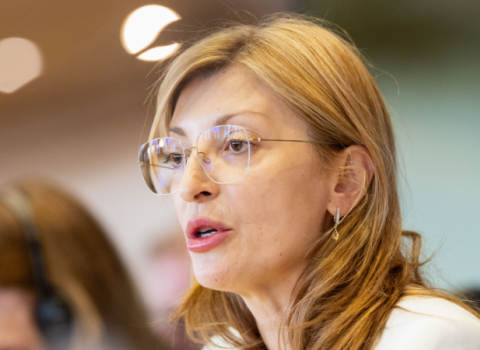
Commission Potočnik: no appetite for top-down coordination.
While in-depth analysis of the responses from universities, research institutions, companies, trade bodies and individuals continues, there is “clearly widespread support for the concept”, the Commission said this week.
The conference was intended to provide time for a stocktake of all the work undertaken since the launch of the debate in April 2007, help to develop key messages for an informal summit ion October and prepare the ground for ERA to be debated at the November Competitiveness Council.
The Commission aims to set out its proposals early in 2008.
“I have launched a debate on the future of research in Europe because I see every day how urgent and essential it is for Europe to get the most out of its research system,” Janez Potočnik, European Science and Research Commissioner, told delegates at the conference.”
The brightest 10 per cent of the combined populations of China and India are equivalent to half the total population of the EU. The rapid development and integration of these emerging nations into the global economy is intensifying the competition.
Potočnik said Europe is confronted with challenges that no single country, industrial sector or scientific discipline can tackle. Energy and climate change is but one such formidable challenge.
Knowledge–based response to challenges
“The only possible answer to sustaining our prosperity and preserve our planet is the knowledge-based society,” he said, adding, “From the impressive number and quality of the contributions we have received so far, it is clear that you share the ambition and the sense of urgency.”
He called on the 400 high-level delegates to help develop a shared and ambitious vision for ERA, with strong sense of co-ownership and to provide momentum to move the project forward.
The consultation has uncovered two major objections: that ERA will centralise control of R&D in Brussels, and that giving scientists the ability to move freely across borders will lead to “cultural homogenisation”.
Potočnik said, “I take the opportunity to send a clear message: the Commission cannot and would not wish to, impose the ERA. A genuine European Research Area will only be created if all researchers, their institutions and companies, the member states and regions as well as the Commission work together in partnership, with each accepting their responsibility for making it happen.
He added that there is no appetite in the Commission, or elsewhere, for top-down coordination.
The consultation identified a number of key issues for the future of the ERA, including public investment, globalisation of research, private sector investment, the emergence of new scientific powers and the specialisation of research activities at EU, rather than national level.
The six priority areas for action suggested by the Commission: researchers, infrastructures, excellence of research institutions, knowledge-sharing, international co-operation, co-ordinated programming and evaluation, and opening ERA to the world, were were all seen as important by respondents. Knowledge-sharing emerged as the most critical aspect of achieving the ERA vision, but researchers as the most important in terms of need for EU-level action.
Main points in each of the six priority areas were:
Knowledge sharing: Most replies called for raw data resulting from publicly-funded research to be made more readily accessible, and argued that peer-reviewed scientific publications should be accessible free of charge.
Responses also underlined the cultural differences between the business and scientific communities. Clear rules to promote knowledge transfer between research institutions and industry were called for, with a requirement that research institutions implement efficient systems to manage intellectual property rights. TV and the Internet were confirmed as the main tools to share scientific knowledge with the wide public.
Researchers: The key requirement is to break down obstacles to mobility. Sixty-two per cent of respondent wanted to see wanted better implementation of the European Charter for Researchers and Code of Conduct for their recruitment, with 75 per cent supporting a “label” for those that implement it. Transferability of pension rights, health insurance, unemployment benefits, and parental leave were also considered critical.
Research infrastructures: Most respondents strongly supported development of pan-European Research Infrastructures as identified by the European Strategic Forum on Research Infrastructures, and agreed that clear leadership should be taken at EU level.
Research institutions: A majority agreed that the standards and competitiveness of EU research institutions would be reinforced if more funding was allocated on a competitive basis. Links with businesses need to be increased through manpower exchange and shared research goals.
Research programmes: Respondents stressed the need for further simplification in FP7, with 62 per cent saying funding rules and procedures have been too complex. The identification of future research challenges and opportunities was suggested as an area for closer EU-wide collaboration. More cooperation between public national research programmes was supported to tackle resource-intensive, complex scientific challenges.
In terms of implementing research across borders, respondents supported both Community programmes (e.g. collaborative projects in FP7), as well as joint “variable geometry” projects with member states to be defined in a bottom-up way.
International cooperation: This is seen as essential. Over 80 per cent of replies highlighted the need for the EU and member states to work more closely together to ensure better coordinated and more efficient international cooperation. Three-quarters agreed that Europe should speak with one voice on global science issues. The EU should be more proactive in defining the global science and technology agenda, and focus on a small number of high profile global issues to lead international research.





 A unique international forum for public research organisations and companies to connect their external engagement with strategic interests around their R&D system.
A unique international forum for public research organisations and companies to connect their external engagement with strategic interests around their R&D system.